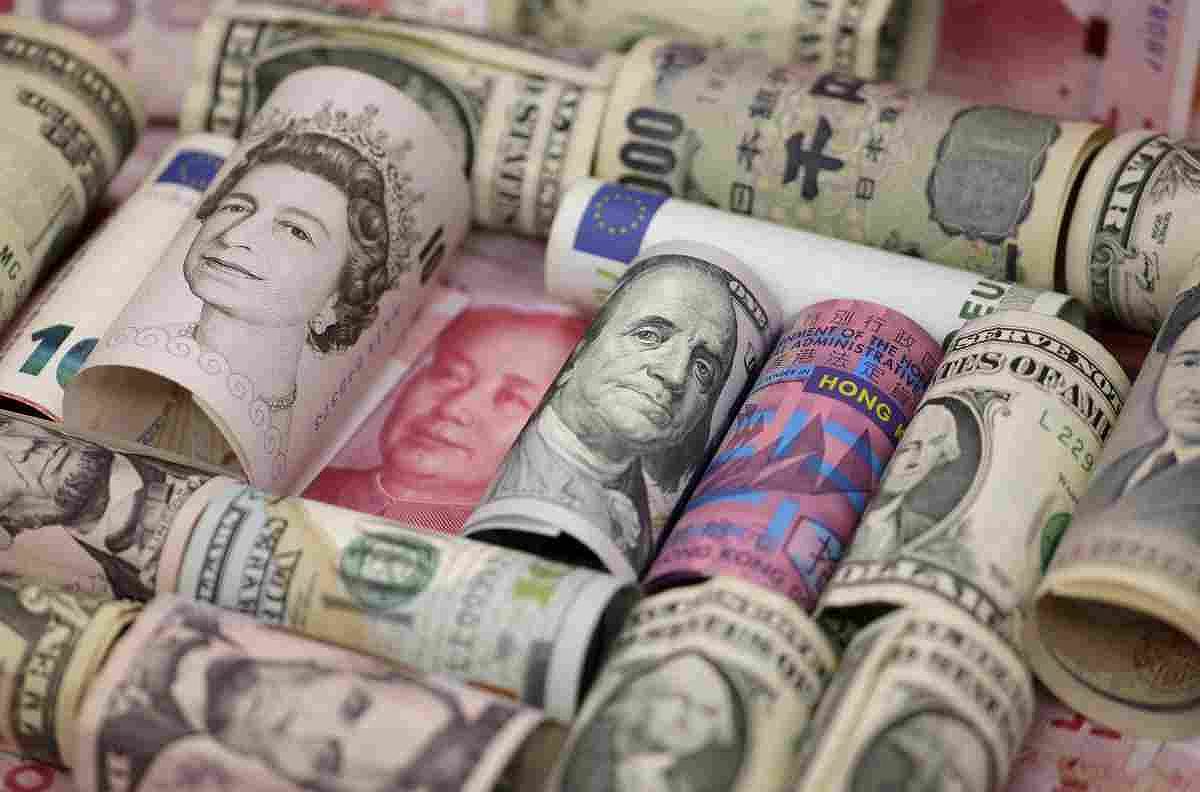
Euro, Hong Kong dollar, U.S. dollar, Japanese yen, British pound and Chinese 100-yuan banknotes are seen in a picture illustration.
11:00 JST, November 27, 2023
SYDNEY (Reuters) – Asian shares got off to a hesitant start on Monday ahead of potentially market-moving inflation data from the United States and Europe later in the week, and a meeting of oil producers that could stop, or extend, the recent slide in prices.
The approach of month end could also cause some caution given the hefty gains investors are sitting on. Japan’s Nikkei added 0.3%, having surged 9% so far in November.
MSCI’s broadest index of Asia-Pacific shares outside Japan was flat, but 6.7% firmer for the month.
S&P 500 futures ESc1 eased 0.1%, while Nasdaq futures NQc1 lost 0.2%. The S&P 500 has now rallied for four weeks straight and up 8.7% on the month so far, which would be its best performance since mid-2022.
The Federal Reserve’s favored measure of inflation is due on Thursday and is expected to slow to its lowest since mid-2021, reinforcing market wagers that the next move in rates will be down.
Fed Chair Jerome Powell will have a chance to push back against the doves at a Fireside Chat on Friday, and there are at least seven other Fed speakers on the docket this week.
“A view we hold strongly is that central banks are unlikely to deliver easing in the first half of 2024 absent a threat to the expansion or financial stability,” agues Bruce Kasman, head of global economics at JPMorgan.
“Indeed, this message of patience is likely to be notable in upcoming DM policy communications in response to recent financial market developments.”
OIL HANGS ON OPEC+
European Central Bank President Christine Lagarde has also sounded in no hurry to ease and will have another opportunity to ram home the message at the EU parliament later on Monday.
Data on EU consumer prices for November is due Thursday and expected to show a cooling in both the headline and core rates, which would support market pricing for cuts.
Markets priced in almost 90 basis points of U.S. easing next year, and around 83 basis points for the ECB.
The chance of an easing in borrowing costs has generated a big rally in bonds, with yields on 10-year Treasuries US10YT=RR down 37 basis points so far this month at 4.49%.
That in turn has been a drag on the dollar which has lost 3% on a basket of major counterparts this month =USD.
The euro was up at $1.0940 EUR=EBS on Monday, not far from its recent four-month high of $1.0965, while the dollar was holding steady at 149.53 yen JPY=EBS.
The drop in yields has been a fillip for non-yielding gold which stood at $2,000 an ounce XAU= and near its October peak of $2,009.29.
The oil market faces a tense few days ahead of a meeting of OPEC+ on Nov. 30, a meting that had originally been slated for Sunday but was postponed as producers struggled to find a unanimous position. O/R
Reports suggest African oil producers are seeking higher caps for 2024, while Saudi Arabia may extend its additional 1 million bpd voluntary production cut, which is due to expire at the end of December.
The uncertainty kept prices tight on Monday and Brent LCOc1 edged up 15 cents to $80.73 a barrel, while U.S. crude CLc1 added 14 cents to $75.68 per barrel.
Top Articles in News Services
-

Survey Shows False Election Info Perceived as True
-

Hong Kong Ex-Publisher Jimmy Lai’s Sentence Raises International Outcry as China Defends It
-

Japan’s Nikkei Stock Average Touches 58,000 as Yen, Jgbs Rally on Election Fallout (UPDATE 1)
-

Japan’s Nikkei Stock Average Falls as US-Iran Tensions Unsettle Investors (UPDATE 1)
-

Japan’s Nikkei Stock Average Rises on Tech Rally and Takaichi’s Spending Hopes (UPDATE 1)
JN ACCESS RANKING
-

Producer Behind Pop Group XG Arrested for Cocaine Possession
-

Japan PM Takaichi’s Cabinet Resigns en Masse
-

Man Infected with Measles Reportedly Dined at Restaurant in Tokyo Station
-

Israeli Ambassador to Japan Speaks about Japan’s Role in the Reconstruction of Gaza
-

Videos Plagiarized, Reposted with False Subtitles Claiming ‘Ryukyu Belongs to China’; Anti-China False Information Also Posted in Japan
























